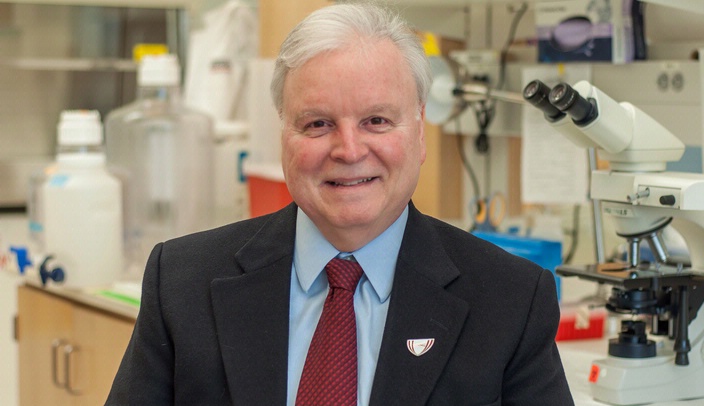University of Nebraska Medical Center researcher, William Rizzo, M.D., has received a five-year, $3.3 million grant to study 10 rare diseases that affect children beginning in infancy or early childhood and throughout their life.
Dr. Rizzo is part of 22 consortia of researchers who will collaborate with 98 patient advocacy groups to advance clinical research and investigate new treatments for children with rare diseases. The collaborations are made possible through $29 million in grants from the National Institutes of Health to expand the Rare Diseases Clinical Research Network, which is led by NIH’s National Center for Advancing Translational Sciences (NCATS).
The diseases Dr. Rizzo treats and studies are probably unfamiliar to most people. They influence the pathway for cholesterol synthesis and metabolism and include diseases such as Sjogren-Larsson syndrome, Smith-Lemli-Opitz syndrome and Hyperimmunoglobulinemia D or Hyper-IgD syndrome. Some of the diseases cause intellectual disabilities, behavior changes and/or physical problems. One disease causes recurrent fevers and rash every four to six weeks for a lifetime.
He said some of the diseases each affect between 500 to 1,000 children nationwide and others, less.
Dr. Rizzo will conduct clinical research studies with patients with the rare diseases using a network in the U.S. and internationally.
“New therapies require knowing the natural progression of the disease. We will learn what happens over time to patients – medical problems and complications and what therapies will be required,” said Dr. Rizzo, a professor of pediatrics and chair of the UNMC division of inherited metabolic diseases. “In many diseases, there’s no specific therapy that works. A physician may see only one or two patients with this disease in the course of his or her career.”
According to the NIH, there is several thousand rare diseases, of which only a few hundred have any treatments available. Combined, rare diseases affect an estimated 25 million Americans.
To develop new treatments, Dr. Rizzo said families with loved ones affected are critically important to learning more about the diseases.
“Patient advocacy groups help increase awareness of the diseases, support each other, raise funds and sponsor family meetings. They partner with us to identify new patients and help us design some studies. We recruit patients from all over country,” Dr. Rizzo said.
Shannon Butalla of Lincoln, co-founded the Global Foundation for Peroxisomal Disorders, which supports families and physicians and scientists. She wants to save families from the difficult and lonely struggle she has had.
Her son, Sam, 12, has a mild form of peroxisome biogenesis disorder – a rare, inherited condition affecting the body’s major systems. The only current solution is to treat the effects of the disease, which include delays in development, vision and hearing loss, seizures, liver, kidney and bone formation problems and feeding issues.
Butalla said Sam was frequently misdiagnosed until he was four-and-a half months old. Physicians told her Sam probably wouldn’t see his toddler years. And just as distressing, she said, few physicians then and now are familiar with the disease and how to manage it.
The Butallas started seeing Dr. Rizzo when he arrived at UNMC in 2003.
“I’m super excited Dr. Rizzo got this grant,” Butalla said. “We need something that’s going to stop deterioration caused by this disease. The fact that we have this passionate group of people who are using every method to serve this underserved population is just phenomenal.”
The Sterol and Isoprenoid Research Consortium (STAIR) studies a group of rare, inherited metabolic diseases that often go undiagnosed and have puzzling symptoms. Even after diagnosis, the diseases have no effective therapies. The consortium will uncover relevant knowledge that can advance the diagnosis and therapeutic options for patients with these rare diseases.
Some of the consortia include Vanderbilt University, Nashville; Baylor College of Medicine, Houston; University of Miami; University of California, San Francisco; Fred Hutchinson Cancer Research Center, Seattle; Emory University, Atlanta; Mayo Clinic, Rochester, Minnesota; Columbia University Health Sciences, New York
Some obstacles to developing rare disease treatments include difficulties in diagnosis, widely dispersed patients and scientific experts, a perception of high risk, and a lack of data from natural history studies, which follow a group of people with a specific medical condition over time.
Through world-class research and patient care, UNMC generates breakthroughs that make life better for people throughout Nebraska and beyond. Its education programs train more health professionals than any other institution in the state. Learn more at unmc.edu and follow us on social media.
Twitter | Facebook | Pinterest | YouTube
